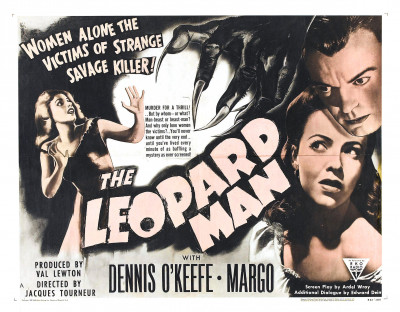| Reviews & Columns |
|
Reviews DVD TV on DVD Blu-ray 4K UHD International DVDs In Theaters Reviews by Studio Video Games Features Collector Series DVDs Easter Egg Database Interviews DVD Talk Radio Feature Articles Columns Anime Talk DVD Savant Horror DVDs The M.O.D. Squad Art House HD Talk Silent DVD
|
DVD Talk Forum |
|
|
| Resources |
|
DVD Price Search Customer Service #'s RCE Info Links |
|
Columns
|
|
|
Leopard Man, The
The Leopard Man was quickly made in response to the success of Lewton's first success, The Cat People (1942). That cost a mere $142,000 but reportedly earned upwards of $4 million. Though it utilizes many of the same production personnel, The Leopard Man isn't nearly as good, nor is as good as some of the later Lewton efforts that followed. It has a couple of great set pieces, but it's weak in other respects.
The movie is apparently set in present-day New Mexico, but it's more a mishmash of Hollywood Latin fantasy, including Finnish actress Tuulikki Paananen as wealthy Consuelo. Partly The Leopard Man is a showbiz yarn, with marginally talented nightclub performer Kiki (Jean Brooks) at odds with castanets specialty act Clo-Clo (Margo). Kiki's publicist, Jerry Manning (Dennis O'Keefe), dreams up an exotic stunt, having Clo-Clo make a splashy entrance at the nightclub with a black leopard on a leash. Clo-Clo, annoyed at being upstaged in the middle of her act, scares off the animal with her castanets and the creature gets loose, eventually killing a young girl, Teresa Delgado (Margaret Landry).
Jerry and Kiki pretend to be hardened showbiz types, but each secretly feels mighty guilty about the girl's death, donating their ready cash to her family while pretending not to give a damn. Meanwhile, more killings follow, but clues suggest the leopard's not to blame. Rather, the grisly murders are the work of a psychopathic killer. Could it be Charlie "How-Come" (Abner Biberman, a role possibly intended for Lon Chaney, Jr.), the leopard's menacing looking trainer; or kindly (and unrelated to this reviewer) Dr. Galbraith (James Bell) who, pipe in hand, offers advice to the amateur sleuths?
The movie has one-and-a-half real good horror set pieces, most memorably following doomed Teresa as her unnecessarily cruel mother locks her out of the house after dark until she returns home with a bag of corn meal. At the general store there's a careful set-up establishing that, as a girl, she was afraid of the dark, and both to and from the store she must walk under a railway bridge, pitch-black and ominous. There's a somewhat illogical but big shock as a train suddenly crosses (an example of "bussing"), and the site of the leopard on the other side and Teresa's reaction is followed by her desperate pleas heard from inside the Delgado home, where Teresa's blood slowly pours in from under the door as the leopard mauls her.
The other big set-piece, a bit less successful, has another victim, the Finnish Consuelo, trapped in a locked cemetery with high walls, and later Clo-Clo herself wanders the nighttime streets in search of some money she dropped coming home.
All this moderately-to-very effective horror material is undermined by script problems, and the distractingly unreal Latin atmosphere. For one thing the movie has too few suspects - exactly two - that it's obvious from the start who the killer is going to turn out to be. Further, in one scene Dr. Galbraith questions Charlie "Home-Come" about his drinking habits, within a matter of seconds convinces this most malleable of men that he just might be the serial killer everyone's looking for.
Dennis O'Keefe and Jean Brooks are fairly appealing but their characters - ruthless on the outside while trying to suppress and keep secret from their partner their true sentimental nature - doesn't play well. It serves no purpose, since their true feelings are quickly revealed to the audience, but not each other until the film is nearly over. The picture seems to have been rushed: the better writer DeWitt Bodeen was originally assigned to pen the script, but his job was turned over to Ardel Wray. Wray also wrote I Walked with a Zombie (1943) and Isle of the Dead for Lewton, but did no other screenplays of note.
Video & Audio
After a soft Reel 1, Shout! Factory's Blu-ray of The Leopard Man, licensed from Warner Bros., looks fairly good, especially considering the poor shape of the RKO film library. There seems to be attempts to max out what the mostly secondary film elements can offer and, overall, it's a very respectable, decent transfer. The DTS-HD 2.0 (mono) Master Audio is adequate, and English subtitles are offered on this region "A" encoded disc.
Extra Features
Supplements include two commentary tracks, an older one by director William Friedkin, a fan of the picture; and a new one by historian Constantin Nasr. There's also a trailer, in poor condition, and an image gallery.
Parting Thoughts
All the Val Lewton/RKO horror titles of the 1940s are worthwhile, including this one. It's definitely in the lower-half of the pack overall, but its couple of big scares are effective. The $29.99 SRP is steep for one movie barely running over an hour, but if you can get it at a discount, it's Recommended.
Stuart Galbraith IV is the Kyoto-based film historian currently restoring a 200-year-old Japanese farmhouse.
|
| Popular Reviews |
| Sponsored Links |
|
|
| Sponsored Links |
|
|
| Release List | Reviews | Shop | Newsletter | Forum | DVD Giveaways | Blu-Ray | Advertise |
|
Copyright 2024 DVDTalk.com All Rights Reserved. Legal Info, Privacy Policy, Terms of Use,
Manage Preferences,
Your Privacy Choices | |||||||













